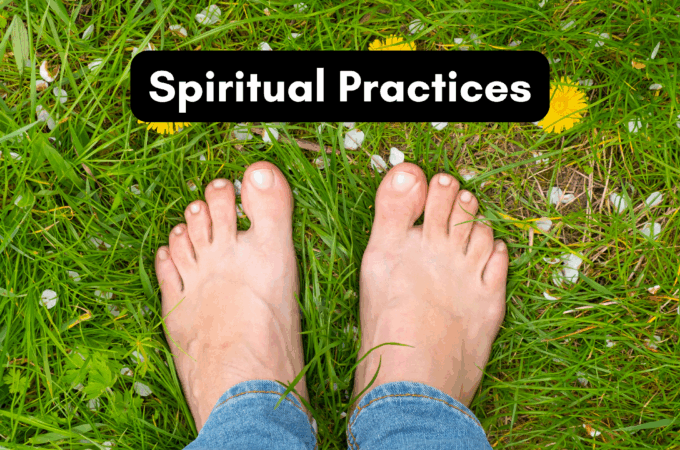I have recently incorporated a new spiritual practice into my daily routine. When the weather permits, I spend 10-20 minutes standing barefoot on the grass in my backyard. This type of practice is often called grounding or earthing– the connecting of our bare skin with the earth.
There have been some studies over the years that show there may be some health benefits to grounding (and some major health benefits to regularly being in nature through practices like forest bathing), but this daily practice has become much more than that for me. It has become a spiritual practice.
Every morning, before the business of the day starts, I stand barefoot on the grass. I feel the breeze against my skin, hear the wind rustling the leaves of the trees. I hear the birds calling to one another. I hear the sounds of the city around me waking up– muffled conversations, cars going by as people commute to work, and dogs barking. I notice condensation on the leaves of the trees near me, the shadows the early morning sun casts on the side of our house, and the feel of the dew-covered grass beneath my feet.
In short, the daily practice of grounding is a set-aside 10-20 minutes when I can experience God’s presence through God’s creation. It is a way to ground myself (see what I did there??) in God before starting my day. When I do grounding as a spiritual practice, I am on holy ground– like when Moses saw the burning bush and God told him, “Remove the sandals from your feet, for the place on which you are standing is holy ground” (Exodus 3:5). I connect with God and my body in those moments. And it is holy.
Why Spiritual Practices Matter
Minimalism is a focus on the aspects of life that matter most and intentionally removing everything else. And when we consider minimalism from a faith and spiritual perspective, spiritual growth is one of the aspects of life that matters most.
This means that when we want to live a simpler life, we prioritize that connection with God– both by ourselves and with others. Individual spiritual practices cultivate our relationship with God one-on-one. Communal spiritual practices (like worship services, prayer/spiritual practice groups, etc.) strengthen our connection with God and with each other.
Nurturing our spiritual lives is central to who we are as spiritual beings; we were created to be with God. God wants to be in relationship with us– and we are invited to be in relationship with God. Spiritual practices are ways to grow in that relationship, to hear God’s voice, feel God’s presence, and seek God’s guidance in our lives.
Seek the Lord while he may be found;
Isaiah 55:6
call upon him while he is near.
Finding spiritual practices that resonate with who God has created each of us to be is integral to the Christian minimalism journey (and as a spiritual being in general!).
Not sure where to start? Try learning about spiritual practices in chapter six of Christian Minimalism: Simple Steps for Abundant Living, or the books Soul Feast: An Invitation to the Christian Spiritual Life by Marjorie J. Thompson and Celebration of Discipline: The Path to Spiritual Growth by Richard J. Foster. Experiment with different spiritual practices, and see what resonates with your soul. Listen for God and experience God’s presence. Be open to practicing your spirituality in ways your wouldn’t expect– I am not an “outdoorsy” person at all, but grounding has been a blessing on my own spiritual journey.
How may God be inviting you into a new spiritual practice?


6 Comments
Stanley Donaway
September 8, 2025 - 10:21 pmI am currently reading Celebration of Discipline. When I read about meditation and scripture, I became very fascinated, especially because my study of Scripture was lacking. Since beginning this new practice of choosing a verse or two, reading and rereading it, writing it out, Journaling on it and praying over it, I have began to see things I had not seen before. Such a blessing.
Becca Ehrlich
September 9, 2025 - 8:21 amFantastic, Stanley! Thanks for sharing. ~Becca (The Christian Minimalist)
Peter Bredlau
September 12, 2025 - 5:36 pmMaybe I’m overthinking 🙂 but what are your suggestions for grounding for us in the Upper Midwest, during ice and snow.
Becca Ehrlich
September 29, 2025 - 8:42 amNot overthinking at all (I also live in an area with ice and snow in the winter)! Grounding mats are made for this purpose, so you can do this indoors where it’s cozy, warm, and dry. 🙂 You can buy grounding mats from lots of places, but here is the one I have that doesn’t break the bank: https://hoogahealth.com/products/hooga-grounding-mat ~Becca (The Christian Minimalist)
GrowaGardenguide
September 28, 2025 - 12:31 amI love how the author shares her personal practice of grounding, making it relatable. It’s inspiring to see how simple moments with nature can deepen one’s spiritual connection.
Becca Ehrlich
September 29, 2025 - 8:44 amAmen! God’s creation can definitely deepen our spiritual connection. ~Becca (The Christian Minimalist)